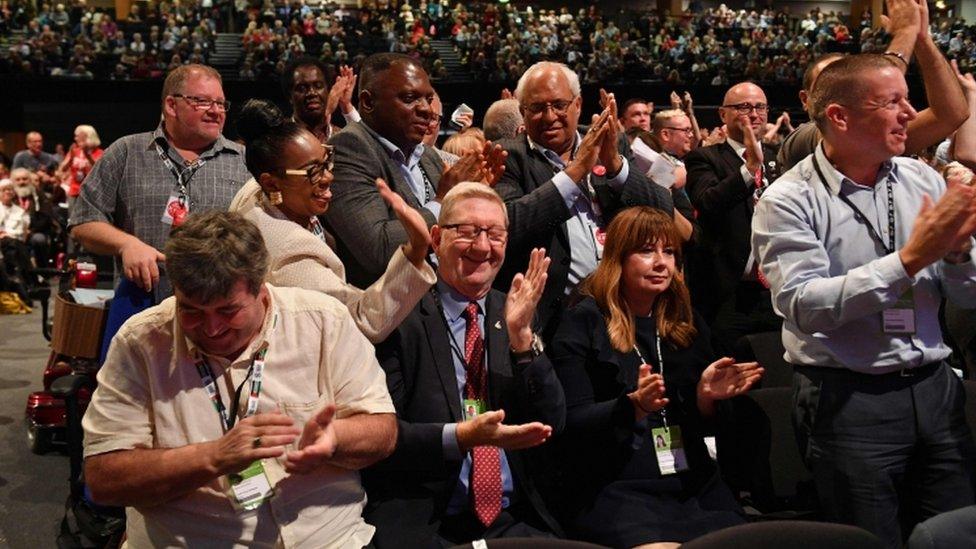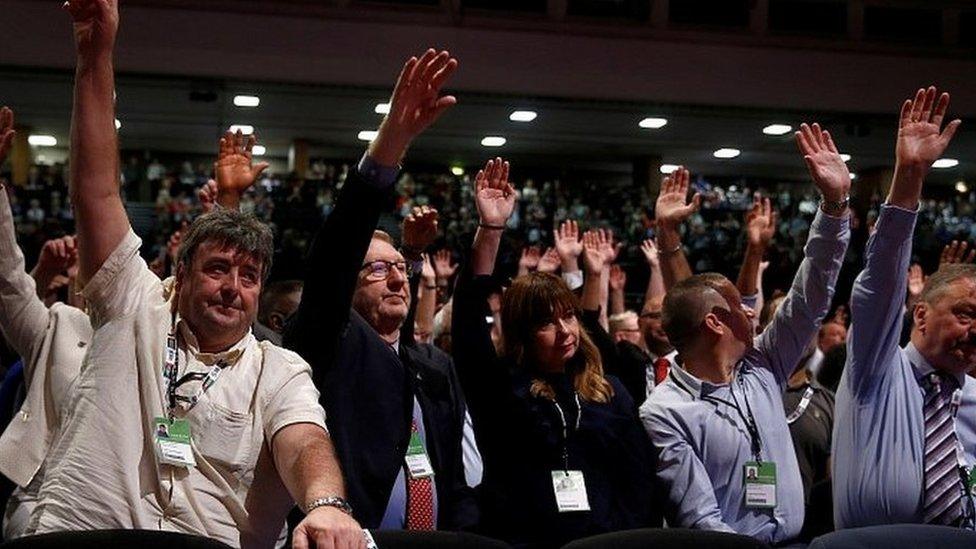Corbyn says 'tide is turning' in Labour's direction
- Published
Jeremy Corbyn: "We will redesign system to supply cheaper medicines"
Jeremy Corbyn has promised to "put the people in power" if he becomes prime minister as he announced plans to compel drug firms to produce affordable versions of patented medicines.
In his closing conference speech, he said the "tide was turning" for Labour "after years of retreat and defeat".
"We'll take on the privileged, and put the people in power," he said.
If Labour wins power, it will set up a publicly owned firm to manufacture generic versions of leading drugs.
In his closing address to the conference, brought forward by a day after the decision by the Speaker to resume Parliament, Mr Corbyn said his party was ready for a general election once the threat of a no-deal Brexit on 31 October had been averted.
The Labour leader called again for Prime Minister Boris Johnson to resign after the Supreme Court declared he had acted unlawfully in suspending Parliament.
But he said his party would not seek to oust Mr Johnson in a vote of no confidence until a no-deal Brexit was taken off the table, suggesting the prime minister could not be trusted not take the country out of the EU during an election campaign.
Corbyn: We must take Brexit "out of the hands of the politicians and let the people decide"
And he defended Labour's own Brexit policy, after a week of wrangling at the conference, saying the promise of another referendum where voters would get the choice between leave and remain "was not complicated".
Looking ahead to the prospect of an election, he said Labour would mount the biggest "people-powered" campaign in history to fight Boris Johnson's "born-to-rule" Conservatives.
'Confidence and hope'
If Labour was elected, he said he would be a "very different prime minister" to those the country were used to, motivated by the desire to spread rather than hoard power,
"I want to put government on your side and power and wealth in your hands," he said.
"Together, we can go beyond defending the gains made by previous generations.
"It's time we started building a country fit for the next generation. Where young people don't fear the future but look forward with confidence and hope.
"The tide is turning. The years of retreat and defeat are coming to an end. Together, we'll take on the privileged, and put the people in power."
Labour, he said, would "rebuild and transform" a country desperate for change after nearly 10 years of austerity "so no-one is held back and no community is left behind".
Promising a bold and radical manifesto, he said rail companies, Royal Mail and the energy grid would be brought back into public ownership and top-earners would pay more tax.
'People before profits'
He also committed a future Labour government to intervene in the pharmaceutical market to ensure drugs only currently available privately will become so on the NHS.
The Labour leader said people were being denied potentially life-saving treatments because drugs firms were not willing to supply their drugs at reasonable prices.
He talked about meeting a nine-year old boy, Luis Walker, a cystic fibrosis sufferer, who, he said, he was not able to get hold of the drug Orkambi.
"Luis and thousands of others are being denied medicines by a system that puts people before profits," he said.
"Labour will tackle this and re-design the system to serve public health, not private wealth, using compulsory licensing to secure generic versions of patented medicines."
He said Labour would make public research and development funding conditional on action by firms to "save money in the health service and to save lives at the same time".
Labour has already pledged to abolish prescription charges in England.
The Conservatives said Labour would leave the UK with "higher taxes and fewer jobs".
And the CBI warned of a lack of respect for business, at the end of a week in which Labour vowed to intervene in the car, energy markets and delegates voted to scrap private schools.
"Firms have faced a volley of attacks, on sectors from life sciences to utilities," said its director Carolyn Fairbairn.
"This is desperately disappointing…Jeremy Corbyn talks about the importance of listening. This must include business."


Mr Corbyn concluded his speech with what he will hope will be the rousing rhetoric to fuel his activists' enthusiasm for the election campaign ahead.
"Oh Jeremy Corbyn!" they sang back.
Delegates here see a government repeatedly humbled by events and they're united in their relish to take on and beat Mr Johnson.
But beyond that divisions are plain to see and, privately, not all are confident they can do it.

- Published23 September 2019

- Published24 September 2019
